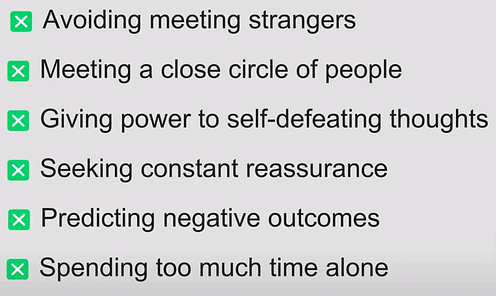Last Updated on August, 2023 by Edison
In this course-level article, we cover how we can reprogram our minds to become confident, persuasive and charismatic.
Limiting Beliefs
When a baby elephant is first brought to a circus, they tie him to a stake with a rope.

At first, he tries really hard to break free. But no matter how hard he tried, he couldn’t cut the rope and eventually gave up.
Then he grows up to be a massive and powerful animal who can easily break chains let alone a rope.
However, he doesn’t even try. Why?

Because he is convinced it’s pointless, he is powerless and cannot escape.
Just like that elephant, when we were kids, we developed certain beliefs and attitudes that still hold us back, often without us even realizing it.
These beliefs might have been helpful at the time, helping us cope with difficult situations. But when we grow up, they can prevent us from reaching our full potential and from enjoying the little things in life.

For example, when I was a kid, I thought bullies were evil and that they would eventually get what they deserved – pain and suffering.
That belief was oddly comforting. It made me feel good. But as I grew up, my perspective began to change.
I learned that bullies often have deep feelings of inferiority and, unable to cope with them, they take it out on others. So, in a way, they were already miserable.
Most importantly, I learned that this rigid view of people I was holding… That if you are good to me, you are a good person. And if you behave badly towards me, you are an evil person.
This view is unhealthy.
Alright, how can you get rid of these beliefs?
Pay attention to your thoughts, especially when you face difficult situations.
Write down those thoughts and beliefs that are filling you with doubt, stress, and fear. In other words, what are you saying to yourself that is preventing you from enjoying the moment?
Then, challenge those beliefs with rational arguments.
A simple way to start is by asking yourself, “Is there an exception to this belief?”
For example, “I always feel anxious around people”.
Now, is there an exception to this belief?
Well yes, I don’t feel anxious when I’m around my best friends. But when I speak to strangers and in group conversations.
That’s what you need to work with.
We went from Always to Sometimes
From All people to Some people
With a simple question.
The next step is to identify the actions that reinforce the irrational belief and do the opposite.

If you feel anxious about talking to strangers, then you need to talk to more strangers. Better yet, find a job that requires interacting with people regularly, like being a waiter, customer service agent, or salesman.
Your greatest enemies are ignorance and inaction because those are the energy sources for your limiting beliefs.
So, you’re trying to cut those sources – You are understanding the internal enemy and you are taking action that makes it weaker and weaker until it perishes.
In the last section of this article, I will explain more about how we can recognize and destroy our limiting beliefs. Consequently, we can unlock our true potential not only in dealing with people but in any area of our life.
Let’s continue with the next insight…
Feeling superior
There are individuals who perceive themselves as being smarter, and more capable than others. And maybe their perception is correct.
But I think that going into the conversation with a sense of superiority makes it difficult to empathize and connect with people.
Let’s say we are conversing and you are at a higher level than me.
You know, you have a higher IQ level and more wisdom. With wisdom, I mean that you have had more significant experiences in your life and derived lessons from them.

Now, I cannot climb to your level. But you have the capacity to step down to my level because you once were like me.
You once were ignorant of a certain field or had very few significant experiences.
This gives you a huge opportunity to build rapport with a wide variety of people.
Keeping this in mind will help you be more grounded and also, more patient.
If you want to increase your level, you need to become a wisdom scavenger. You constantly seek out great ideas and arguments that can help you make progress in your life.
It might be from various sources… books, conversations, observations. You never know when you will hear something profound.
Passion
We all love people who are full of excitement.
We are attracted to them because, deep down, we ALL want to be passionate about something.
When others see the passion in your eyes, you become more charismatic. It doesn’t mean everyone will like you, but they’ll respect your conviction and passion.
How to be passionate about something?
It’s simple.
Dedicate a portion of your time to learning more about your subject.
Read books, watch courses, and apply what you learn.
You can also find someone who’s an expert in your field and offers to work for them for lower pay.
It can be a great decision because you can learn from both his/her successes and failures.
What if I don’t know what I’m passionate about?
Experiment with different fields. You don’t know whether you like a certain food unless you take a bite.
Transparency
To make someone feel comfortable opening up to you, share some personal details about yourself. It sends a strong message that you trust them.
You can talk about your hobbies, stories, opinions, certain beliefs and views.
But when it comes to sensitive subjects like politics or religion, you need to be diplomatic, especially with people you don’t know well.
We all have seen conversations deteriorating just because people have opposing views. It brings out our tribal instincts.
Disclosing things about yourself can also help turn negative aspects into advantages.
For example, many celebrities are open about their mistakes and failures.
It makes them appear more relatable, and down to earth, and also take control of their narrative.
You may have seen the movie 8 Mile where Eminem lists all the negative stuff his opponent could say, and he basically disarmed him.

So how can you use this strategy?
Think about your life experiences – The good, bad, and ugly. How did they change you? What were the important lessons?
For example, depending on the conversation, I might talk about my struggle with anxiety, depression, obesity, cigarette addiction, family and economic problems, etc.
I overcame these problems and I don’t mind talking about them.
It makes people think I’m a very honest person. So they feel comfortable talking to me.
I carefully select which stories I’m going to tell. It doesn’t have a huge impact if I talk about losing weight to someone who’s slim. There’s something else that is more concerning to him that we can talk about.
It’s also important to understand that we don’t share these mini-stories to make people feel sorry for us or even feel sorry for themselves.
Self-pity it is such an unattractive, off-putting, and unnecessary emotion.

The idea is not to throw a pity party but to make ourselves relatable.
And IF they ask for your advice, you’re in a good position to be helpful.
Taping into those experiences will make you understand people on a deep emotional level because you have been where they are. And this makes it easier for you to connect with them.
Transparency is a powerful way to build rapport but you also want to create an ongoing curiosity between you and others.
Don’t be the person who wants to meet every day and talk about anything.
You also don’t want to be the mysterious guy, as if you’re working for the CIA.
The first makes you dull. The second frustrates people because they feel like they don’t know you and can’t trust you.
So, you need to strike a balance of disclosure and intrigue.
Self-Discipline
When you indulge in foods, alcohol, cigarettes, gaming… dopamine is released, making you feel good.
In the long term, bad habits and addictions will cause you serious physical and psychological issues.
In the short term, it erodes your confidence.
Here’s why:
Dopamine has a very short effect. And you need to feed it to get the same pleasurable feeling constantly. E.g., Drinking two small glasses of alcohol makes you feel good, and you have a good time at a dinner or party. But when you continue to drink regularly (+2 times/week), those two glasses do not affect you.
The reason is that you have set a new threshold for dopamine to be released. Eventually, you need more and more alcohol to get that same feeling.
It’s a similar process to other substances or activities.
So you don’t have full control over yourself anymore.
Conversely, when you work into developing discipline, another chemical called serotonin will be released. It is a much more powerful feeling that lasts for a long time and encourages you to continue improving yourself.
When you are disciplined, you send a strong message of tranquillity. And that makes you very attractive.
What can you do to strengthen self-discipline?
- Break your goals into smaller pieces.
- Visualize what you’re going to get rather than what you’re giving up now
- Make sure your goal is really what you want
- Prepare yourself mentally that you might have a few setbacks
Standing for something
It is a common strategy used by marketers and politicians. They find what issue is bothering their audience and they talk about it.
For example, if your audience is worried about climate change, you say that the company is committed to going green.
You can use a similar strategy in communication. When you notice someone is sensitive about a particular issue, you make advocacy statements and basically agree with them.
What if you disagree? Then you ask simple questions to get them to talk more about what they are clearly emotionally invested in.
And if you’re convinced they’re wrong, you can express your opinion in a calm manner or elegantly change the conversation.
As I said earlier, you need to be careful when discussing certain issues.
You see, many people connect their opinions with their identity. So they won’t appreciate people who question certain beliefs and opinions, and they might consider it a personal attack.
Obviously, it’s very healthy to be flexible – to change your stance based on new facts and rational arguments. But many people can’t accept the feeling of being wrong.
My theory is that we have been conditioned as kids that when we made a mistake we got punished.
Consequently, we grow up with the fear of being wrong because we associate it with punishment.
Limiting Beliefs (Part 2)
I understand that finding those limiting beliefs and fixing them is a challenging task. But it’s necessary.
Think of yourself as a programmer trying to find the bugs in your code, otherwise, the software won’t work properly.

I’d advise you to start reflecting on the moments when you felt the weakest.
Because when you are feeling intense negative emotions, that’s when you’re the most impressionable.
You latch to certain explanations from people you trust, from Google, from your own observations that are WRONG but it makes you feel good. It gives a sense of meaning; a sense of security.
You rationalize why this explanation is true, you act according to this belief, and you keep multiplying the lies you tell to yourself.
And in extreme cases when the level of indoctrination is high, people change the entire lifestyle according to their limiting beliefs.
Typical examples are people suffering from social anxiety; people who refer to themselves as incels; Some people who are raised in strict environments, etc.
For them, it’s very difficult to change on their own, so they need to go to therapy.
Alright, let’s summarize the process of breaking limiting beliefs:
We have the awareness that this belief is wrong and we need to do something about it.
We devise a strategy to defeat this internal enemy – Which is gathering information + taking action.
Then we have the most important element which is making a decision to do whatever it takes to improve.
When you really decide to change, something clicks in your brain and it becomes easier to conquer those situations.
The following are narratives that we have created to unconsciously limit ourselves.
It will kill your charisma and you won’t be able to take advantage of opportunities that knock at your door.
So, it’s absolutely essential to constantly examine what types of thoughts and beliefs are holding you back, and get rid of them.
Defeatist Narrative
I have been like this my entire life. Why would anything change?
I have no control over my life.
I fail in everything I do, so why even try?
I have achieved nothing in my life.
I need to be great at ______ otherwise, I’m a worthless person.
I’m not worthy of love or affection.
I’m addicted to drama/food/games/sugar/weed/alcohol/porn.
In the past I have wronged others, so I deserve to go to hell and suffer for eternity.
Unfairness Narrative
Life works very well for others but not for me.
Other people have had it easy because they didn’t face my challenges.
It’s my parents’ fault that I’m like this.
If I hadn’t been bullied, I wouldn’t be like this.
It’s their fault that I’m failing and suffering.
Incapable Narrative
I always say or do something embarrassing.
People making fun of me is an unbearable feeling.
It’s impossible to handle negative thoughts.
I cannot stand boredom.
I need to be 100% sure before doing something because I cannot handle doubt.
It’s better to hang out with toxic friends than to be alone.
I must impress these new people I’m meeting.
I am not interesting enough.
Entitlement Narrative
I’m a very sensitive person, so people need to be careful when talking to me.
I always treat people fairly and I’m nice to them, so they need to do the same.
If you don’t treat me with respect, then you are a bad person.
Grandiose Narrative
I have a magical ability to make people do what I want.
I’d never do something foolish, because I’m a very intelligent person.
I’m always right, and it frustrates me that others don’t see it.
I have to be the center of attention.
Sources:



